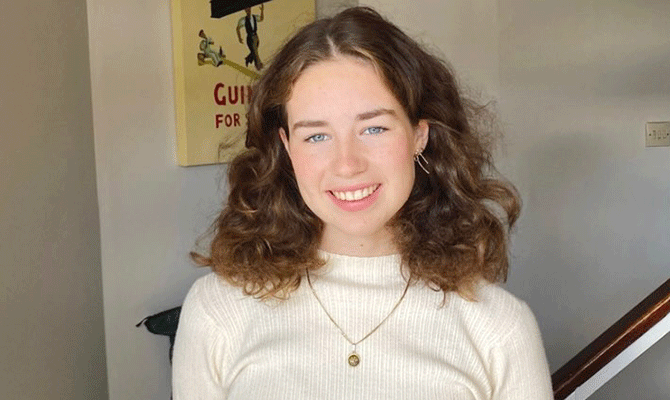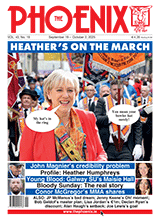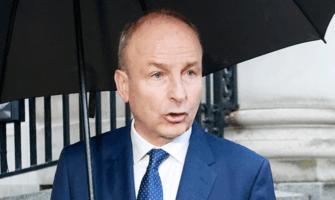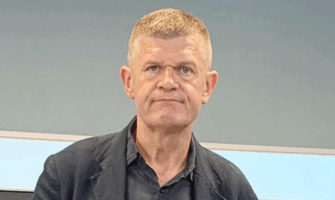
Maisie Hall
UNIVERSITY OF GALWAY (formerly known as NUIG) Students’ Union (SU) has a new president, Maisie Hall. Hailing from Dingle, Co Kerry, and born to English parents, she received the highest number of votes ever for the position of Galway SU president, beating Elijah Burke (of the Burke’s of Castlebar). Hall is something of an anomaly among her SU presidential peers nationwide in that she is not active in a political party and previously held only the most junior of SU hack positions (class rep).
She freely admits that she leans towards the Green Party but has never been a member of it or any other party for that matter. She is openly supportive of presidential candidate Catherine Connolly but Galway SU will not be endorsing the Syrian tourist and will instead be focusing on campus initiatives.
Hall – like her UCD counterpart, Michael Roche (see The Phoenix 17/4/25), and unlike her Trinity counterpart, Seán Thim O’Leary (see edition 4/9/2025) – won her election quite comfortably on the first count. She received 3,464 votes from a total poll of 4,640, more than doubling the 2024 election turnout.
She is clearly a well-known personality on campus, having twice organised the incredibly popular student initiative Coldvember (a month-long charity sea swim initiative), served on several campus committees and participated in TG4’s fashion design show Síorstíl.
While Maisie credited her campaign, which included her baking 900 brownies (what’s wrong with apple pie?) for the record support, she also acknowledged the role of one of her opponents, Elijah Burke. The younger brother of Mountjoy regular Enoch came second, receiving 5½ times fewer votes (617) than Hall.
This is a resounding defeat for Burke, who isn’t used to such, having won a Supreme Court case in 2020 against then education minister Norma Foley. The legal victory forced the State to recognise his home-schooled predicted grades.
Burke’s SU presidential campaign was managed by elder brother Simeon, who was himself defeated in the 2021 Galway SU election and whose struggles to obtain a master at the Law Library have been well publicised.
Elijah’s campaign centred on several things – longer opening hours for campus coffee shops, bringing back paper cups and combatting what he viewed as the promotion of “transgenderism” on campus via the T-Fund (an SU-financed fund to help with the cost of transitioning socially, ie clothes).
While Goldhawk does not doubt Hall’s credentials and campaigning ability, it seems Burke’s controversial campaign motivated Galway students to vote for Maisie and give the SU a resounding 22% turnout, which is among the highest in the country.
Hall’s campaign in parts was similar to Burke’s, focusing on longer opening hours for a campus café and more student engagement. But Hall’s campaign had no issue with the T-Fund and, instead of bringing back paper cups, focused on bringing back free butter in the campus’s Bialann café (for which students are charged 25c a packet).
Also winning a spot on the Galway SU executive (but in an uncontested race) was Seán de Búrca, elected as vice-president for education. De Búrca fills the party-political vacuum left in the SU by president Hall.
A member of the Social Democrats, de Búrca previously sat on its national executive from 2022-24 alongside future TDs Jen Cummins, Aidan Farrelly and Eoin Hayes. De Búrca notes he received more votes in the race for the party executive than Palantir darling and forgetful stock owner Hayes. Fellow SU hack and former UCDSU president Martha Ní Ríada replaced de Búrca on the executive until July last, when she resigned due to the re-admittance of Hayes to the Soc Dems.
Galway SU’s outgoing president, Faye Ní Dhomhnaill, has since taken up another union job, now acting as vice-president for campaigns in the nationwide student’s union AMLÉ (formerly known as USI). Her tenure in Galway saw protests against the Asterisk research project, of which both University of Galway and Technion are members. Technion, a university in Haifa, Israel, has previously been described as an “essential cog in the Israeli war machine”. Ní Dhomhnaill, not Hall, presided over what were seen as successful attempts at resisting this partnership.
On March 7, six days before the Galway SU election, the university’s Palestinian Solidarity Society (PSS) declared victory. The university announced it was “pausing” the partnership with immediate effect and the PSS was “confident” that this was the end of the collaboration.
This was to be followed by a retrospective human rights impact assessment (HRIA), with the university giving a tentative four-week timeframe for the HRIA’s completion. Hall caught up with the action by proposing that HRIAs be completed and publicised on future University of Galway partners.
The university’s silence was finally broken just as students began to shuffle back into lectures. On September 6, two days before new university president David Burn was set to begin his role, it announced that it would be resuming its research collaboration with Technion, while promising not to “participate in any new institutional research agreements involving direct Israeli partners, until further notice”.
Goldhawk notes that “until further notice” is a loose burden at best.
The university, then under the leadership of interim president Peter McHugh, claimed that new legal advice led it to abandon the HRIA and to see out its contractual obligations surrounding Asterisk.
On September 8 a protest was organised by the PSS, with Galway SU in attendance, to push the university to reverse this decision. Hall was photographed handing a list of demands to Prof Burn, which included an end to all current and future collaborative projects with Israeli institutions and a university-wide boycott of any Israeli goods or services.
Burn was the preferred candidate for university president among many in the SU. Chair of the university’s Governing Authority and former FF minister Máire Geoghegan-Quinn said Burn would present “a compelling vision to inspire University of Galway’s staff and students to take this remarkable university to new heights”.
The question on the lips of many students is whether he will take a stand against collaboration with Israel as pressure mounts. Escalation in the form of direct action is now expected from the PSS and Galway SU, including rumours that the iconic Big Yellow Thing (an abstract art piece on campus) will be painted red.
Hall is clearly popular in Galway and she differs from her SU counterparts elsewhere in that she lacks the obvious political ambition they mostly possess. The university’s decision to resume an Israeli partnership provides an early test for her and she may face choices as to where her energy is best spent.
Will Hall’s year in charge land her in hell or launch her out of Connaught?



















